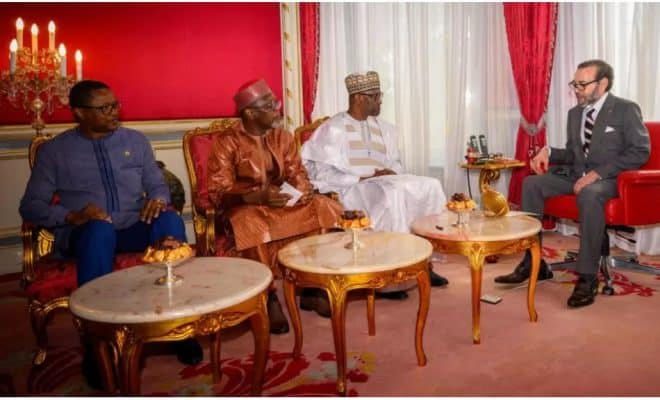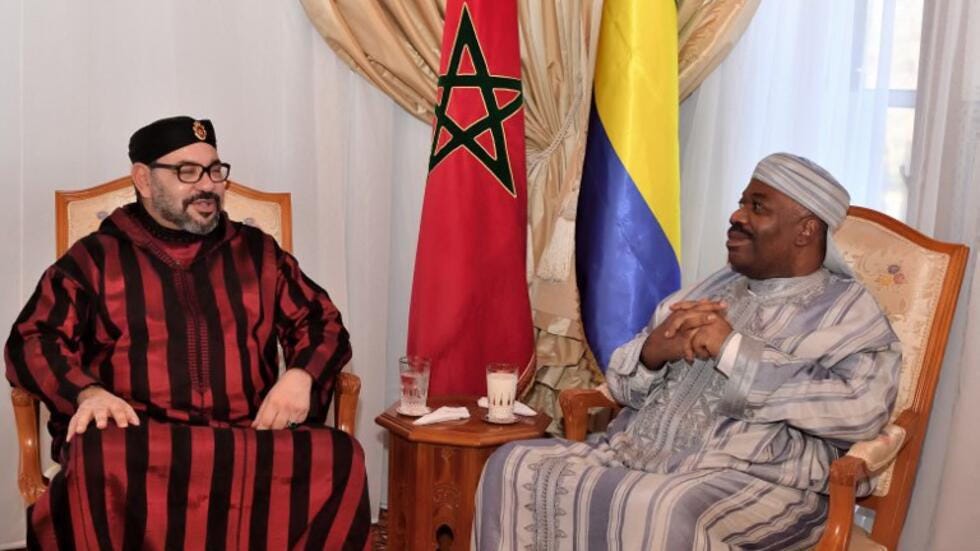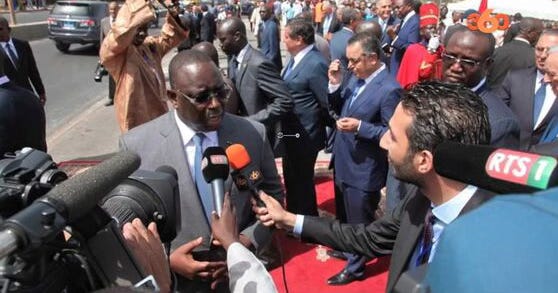On April 28, 2025, the royal palace in Rabat hosted a historic moment: the foreign ministers of Mali, Niger, and Burkina Faso, united under the Alliance of Sahel States (AES), hailed King Mohammed VI’s bold initiative to open the Atlantic to landlocked nations. This summit was more than a diplomatic gathering; it crowned Mohammed VI as a pivotal figure, a veritable “King of the Sahel,” reshaping the region’s future with unparalleled vision. In 2015, I had the privilege, as the first independent Moroccan journalist and editor-in-chief of *Le360*, to cover the king’s tour of Senegal, Côte d’Ivoire, Guinea-Bissau, and Gabon.
I witnessed firsthand the sincerity of Mohammed VI, infusing every handshake and signed agreement with unique energy. This was not mere diplomacy—it was a deep commitment to South-South partnership. This article explores Mohammed VI’s strategic role in the Sahel, rooted in a coherent African vision, and shows how his leadership is transforming the region.

An African commitment from the outset
To grasp the scope of Mohammed VI’s influence, we must look back to his early days as head of state. In 2000, just a year after ascending the throne, the young king chose Cameroon for his first official foreign visit. This was no random choice. Under his father, Hassan II, sub-Saharan Africa was sidelined, with focus directed toward Europe and the Arab world. Mohammed VI saw opportunity in the continent—not for domination, but for collaboration. This visit to Cameroon laid the foundation for a bold foreign policy, marked by investments, partnerships, and a determination to bridge the historical divide between the Maghreb and sub-Saharan Africa.
2015: An African tour etched in my memory
In April 2015, I was on the ground covering Mohammed VI’s tour of Senegal, Côte d’Ivoire, Guinea-Bissau, and Gabon. It remains one of the most defining moments of my career. In Dakar, I observed the king’s meeting with President Macky Sall, an exchange filled with warmth and commitment. Right after, I interviewed Macky Sall, who, visibly moved, shared his joy at the king’s visit and the impressive number of contracts signed with Moroccan operators. Originally planned for 8 days, the visit way extended to 10 days. Free from protocol, I saw Mohammed VI stroll along Dakar’s corniche with locals or drive his car at dawn with minimal security—a gesture that won the hearts of Senegalese.
In Abidjan, the announcement of Moroccan investments in agriculture and infrastructure sparked palpable excitement among Ivorian entrepreneurs eager to partner with a nation seen as an equal.
In Guinea-Bissau, Mohammed VI made history as the first head of state since 1976 to spend two nights in the presidency palace, renovated by his team a month prior. In a country often overlooked by global diplomacy, this gesture carried immense symbolic weight. As the king crossed Bissau’s main boulevard, surrounded by a jubilant crowd, the scene resembled a pope greeting his faithful. Agreements to bolster sustainable fishing, a cornerstone of the local economy, forged a lasting bond with this small nation.
In Gabon, discussions with Ali Bongo focused on the environment, an area where Morocco was emerging as an African leader.
Notably, Ali Bongo drew inspiration from Mohammed VI’s style, adopting the Moroccan jellaba, babouches, and tarbouch. The reception hall in his Libreville palace, adorned with Fassi zellige, could have been plucked from a Moroccan royal residence, reflecting deep cultural influence.

What struck me most was the king’s sincerity. In Dakar, he took time to engage with Senegalese students trained in Morocco, inquiring about their dreams. This tour was not a public relations stunt—it embodied a long-term strategy positioning Morocco as a reliable ally, far from the colonial or opportunistic postures of other powers.
The Sahel: A strategic priority
The Sahel, with its security, economic, and climate challenges, has become a key arena for Moroccan diplomacy. Mohammed VI has capitalized on France’s gradual withdrawal and the decline of Algerian influence in the region. His flagship initiative, launched in 2023, aims to provide landlocked Sahel nations—Mali, Niger, Burkina Faso, and Chad—access to the Atlantic through Moroccan port infrastructure, notably the future Dakhla megaport.
At the April 2025 Rabat meeting, Burkina Faso’s Foreign Minister, Karamoko Jean-Marie Traoré, called this project a “godsend” for Sahel economies. Beyond economics, the initiative seeks to unlock populations, boost trade, and ease tensions stemming from geographic isolation.
Mohammed VI’s commitment extends beyond infrastructure. Since 2013, Morocco has trained Malian imams to promote moderate Islam, countering the influence of extremist groups like JNIM or the Islamic State in the Greater Sahara. In 2014, I analyzed these efforts in my *Le360* articles, and their impact remains undeniable: by offering a spiritual and educational alternative, Morocco tackles the roots of extremism. The kingdom also shares security expertise, training Sahel forces to better address cross-border threats.
Economic and cultural soft power
Morocco wields impressive economic soft power. Companies like OCP invest in sustainable agriculture in the Sahel, while the Nigeria-Morocco gas pipeline, backed by Mohammed VI, promises to transform West Africa’s economy. These initiatives reflect a vision of co-development, with shared benefits. During my 2014 coverage, I noted the enthusiasm of African entrepreneurs for Moroccan partnerships, seen as less paternalistic than those with former colonial powers.
Culturally, Morocco promotes a tolerant model of Islam, resonating in a region where religious tensions fuel conflict. Imam training, academic exchanges, and cultural festivals strengthen human ties between Morocco and the Sahel. This subtle yet powerful approach contrasts with the military interventionism of other actors.
Challenges and rivalries
Despite these advances, Mohammed VI faces obstacles. Rivalry with Algeria, intensified by tensions with the AES (notably after the March 2025 Malian drone incident), complicates regional dynamics. Algeria, seeking to maintain its influence, views the Atlantic initiative as a threat. Meanwhile, the growing presence of Russia, China, and Turkey adds further complexity. Some, on platforms like X, accuse Morocco of acting as a French proxy—a criticism I’ve heard in West Africa and find reductive. Morocco, under Mohammed VI, pursues an autonomous path, as evidenced by its steadfastness during tensions with France, where the kingdom held firm, putting Paris on the defensive.
The Atlantic access project, though visionary, remains in its early stages. Logistical, financial, and political challenges are immense, and success hinges on Morocco’s ability to rally international partners. Yet, the momentum from the April 2025 Rabat meeting, where the AES expressed “full support,” suggests tangible progress.
A visionary king?
Mohammed VI is not merely a monarch; he is a bridge-builder, both literally and figuratively, between Morocco and Africa. From his first visit to Cameroon in 2000 to his 2015 tour to his central role in the Sahel in 2025, he embodies a radical break from his father Hassan II’s approach and an ambition for a united continent. His sincerity, which I felt in Dakar as he engaged with students, in Bissau amid a jubilant crowd, or in Abidjan facing enthusiastic entrepreneurs, is not diplomatic veneer—it is the driving force of a strategy blending pragmatism and idealism.
The Sahel, with its crises and promises, stands at a crossroads. Can Morocco, under Mohammed VI’s leadership, become the linchpin of a stable, prosperous region? The future will tell, but one thing is certain: the king has already changed the game. What do you think? Is Morocco the key to a peaceful Sahel, or are its ambitions too grand for such a complex region? Share your thoughts in the comments and subscribe to explore more facets of Africa’s transformation.






